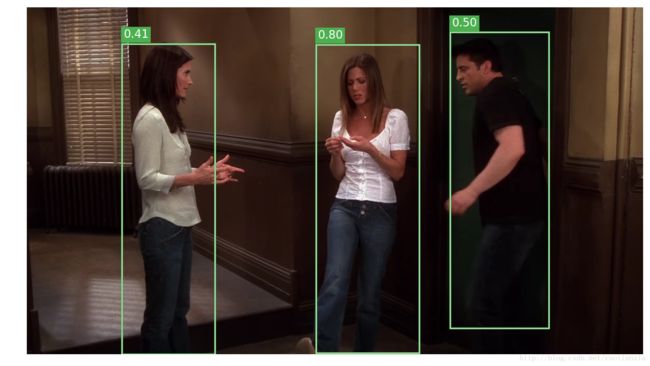Person Search 学习 一
Joint Detection and Identification Feature Learning for Person Search
这篇是学习 Joint Detection and Identification Feature Learning for Person Search的代码的记录 。https://github.com/ShuangLI59/person_search
- 一、Caffe编译-cmake
cd caffe/
mkdir build && cd build
cmake .. -DUSE_MPI=ON -DCUDNN_INCLUDE=/usr/local/cuda/include -DCUDNN_LIBRARY=/usr/local/cuda/lib64/libcudnn.so
make -j8 && make install
cd ../..
cd lib && make && cd ..- 二、运行代码
按照github上网页进行操作,把代码与数据放入相应的文件夹,然后运行:
python2 tools/demo.py –gpu 0

- 三、代码阅读
先从上面运行的demo.py开始看。
用eclipse 运行程序的时候,路径一定要写成绝对路径,否则会报错。
import _init_paths #_init_path里面是一些添加Caffe路径与lib的代码,如果在运行其他代码时,找不到 caffe,就 import _init_paths
import argparse # 是python的一个命令行解析包,输入参数,同时会返回一个输出
#import argparse
#parser = argparse.ArgumentParser()
#parser.add_argument("square", help="display a square of a given number",type=int)
#args = parser.parse_args()
#print args.square**2
#python test1.py 4 会输出16
import time #Python time time() 返回当前时间的时间戳
import os #这个模块主要是操作文件的一个模块,具体命令,见网址https://www.cnblogs.com/kaituorensheng/archive/2013/03/18/2965766.html
import sys #sys模块包含了与Python解释器和它的环境有关的函数。
import os.path as osp #查询文件路径的包
from glob import glob#glob是python自己带的一个文件操作相关模块,用它可以查找符合自己目的的文件,就类似于Windows下的文件搜索,
import numpy as np
import matplotlib as mpl
import matplotlib.pyplot as plt
import caffe
from mpi4py import MPI #Python环境下使用MPI接口在集群上进行多进程并行计算的方法。
#下面的几个文件是代码使用的rcnn的几个文件
from fast_rcnn.test_probe import demo_exfeat
from fast_rcnn.test_gallery import demo_detect
from fast_rcnn.config import cfg, cfg_from_file, cfg_from_list
def main(args):
if args.cfg_file is not None:
cfg_from_file(args.cfg_file)
if args.set_cfgs is not None:
cfg_from_list(args.set_cfgs)
'''下面的是 cfg_from_file 函数:
__C = edict()
def cfg_from_file(filename):
"""Load a config file and merge it into the default options."""
import yaml #YAML它是一种直观的能够被电脑识别的数据序列化格式,是一个可读性高并且容易被人类阅读,容易和脚本语言交互,用来表达资料序列的编程语言。
with open(filename, 'r') as f:
yaml_cfg = edict(yaml.load(f))
_merge_a_into_b(yaml_cfg, __C)
#open/文件操作 f=open('/tmp/hello','r') #open(路径+文件名,读写模式),r是只读,网址https://www.cnblogs.com/dkblog/archive/2011/02/24/1980651.html
#A merge with B 是说A和B合并在一起,成为一个整体
A merge into B 是说A合并成B.可以用成 A and B merge into C,很多东西合成一个.
#yaml.load(f)下载文件
#easydict和结构体差不多https://pypi.python.org/pypi/easydict/
小程序太多,先学习整体的框架吧!!!
'''
# Setup caffe,调用GPU
if args.gpu >= 0:
caffe.mpi_init()
caffe.set_mode_gpu()
caffe.set_device(cfg.GPU_ID)
else:
caffe.mpi_init()
caffe.set_mode_cpu()
# Get query image and roi
query_img = 'demo/query.jpg'
query_roi = [0, 0, 466, 943] # [x1, y1, x2, y2]
# Extract feature of the query person
net = caffe.Net(args.probe_def, args.caffemodel, caffe.TEST) #构建net
query_feat = demo_exfeat(net, query_img, query_roi) #提取嫌疑人的特征
'''
def demo_detect(net, filename, blob_name='feat', threshold=0.5):
im = cv2.imread(filename)
boxes, scores, feat_dic = _im_detect(net, im, None, [blob_name])#一个检测目标类的函数,返回检测框的坐标与中心;返回特征值
j = 1 # only consider j = 1 (foreground class)
inds = np.where(scores[:, j] > threshold)[0]
cls_scores = scores[inds, j]
cls_boxes = boxes[inds, j*4:(j+1)*4]
boxes = np.hstack((cls_boxes, cls_scores[:, np.newaxis])).astype(np.float32)
keep = nms(boxes, cfg.TEST.NMS)
boxes = boxes[keep]
features = feat_dic[blob_name][inds][keep]
if boxes.shape[0] == 0:
return None, None
features = features.reshape(features.shape[0], -1)
return boxes, features
'''
del net # Necessary to release cuDNN conv static workspace
# Get gallery images
gallery_imgs = sorted(glob('demo/gallery*.jpg'))
# Detect and extract feature of persons in each gallery image
net = caffe.Net(args.gallery_def, args.caffemodel, caffe.TEST)
# Necessary to warm-up the net, otherwise the first image results are wrong
# Don't know why. Possibly a bug in caffe's memory optimization.
# Nevertheless, the results are correct after this warm-up.
demo_detect(net, query_img) #作者说这个网络需要预热,不然第一幅图的结果会是错误的
for gallery_img in gallery_imgs: #分别对gallery_imgs的图像进行检测
print gallery_img, '...'
#/home/mmt/Desktop/person_search/demo/gallery-1.jpg ...
boxes, features = demo_detect(net, gallery_img,
threshold=args.det_thresh)
'''boxes:(框的坐标与得分值)ndarray: [[ 9.00976990e+02 1.15154030e+02 1.22301392e+03 1.07562256e+03
9.86511052e-01]
[ 2.95601501e+02 1.12586487e+02 5.85551697e+02 1.07900000e+03
9.70531642e-01]
[ 1.31922742e+03 7.68123016e+01 1.62724524e+03 9.98467834e+02
9.23337400e-01]]'''
if boxes is None: #如果检测不到结果,那么进行下一个循环
print gallery_img, 'no detections'
continue
# Compute pairwise cosine similarities,
# equals to inner-products, as features are already L2-normed
similarities = features.dot(query_feat) #计算所检测人的特征与嫌疑人的相似性 【ndarray: [ 0.79530442 0.41088727 0.50463068]】
# Visualize the results
fig, ax = plt.subplots(figsize=(16, 9))
ax.imshow(plt.imread(gallery_img))
plt.axis('off')
for box, sim in zip(boxes, similarities):#zip()函数在运算时,会以一个或多个序列做为参数,返回一个元组的列表。同时将这些序列中并排的元素配对。
x1, y1, x2, y2, _ = box
ax.add_patch(
plt.Rectangle((x1, y1), x2 - x1, y2 - y1,
fill=False, edgecolor='#4CAF50', linewidth=3.5)) # 画框
ax.add_patch(
plt.Rectangle((x1, y1), x2 - x1, y2 - y1,
fill=False, edgecolor='white', linewidth=1))
ax.text(x1 + 5, y1 - 18, '{:.2f}'.format(sim),
bbox=dict(facecolor='#4CAF50', linewidth=0),
fontsize=20, color='white')#添加文本框,显示得分值
plt.tight_layout()
fig.savefig(gallery_img.replace('gallery', 'result'))
plt.show()
plt.close(fig)
del net
#利用 argparse包输入参数,设置GPU,文件的路径等
if __name__ == '__main__':
parser = argparse.ArgumentParser(description='Person Search Demo')
parser.add_argument('--gpu',
help='GPU id to be used, -1 for CPU. Default: 0',
type=int, default=0)
parser.add_argument('--gallery_def',
help='prototxt file defining the gallery network',
default='models/psdb/resnet50/eval_gallery.prototxt')
parser.add_argument('--probe_def',
help='prototxt file defining the probe network',
default='models/psdb/resnet50/eval_probe.prototxt')
parser.add_argument('--net', dest='caffemodel',
help='path to trained caffemodel',
default='output/psdb_train/resnet50/resnet50_iter_50000.caffemodel')
parser.add_argument('--det_thresh',
help="detection score threshold to be evaluated",
type=float, default=0.75)
parser.add_argument('--cfg', dest='cfg_file',
help='optional config file',
default='experiments/cfgs/resnet50.yml')
parser.add_argument('--set', dest='set_cfgs',
help='set config keys', default=None,
nargs=argparse.REMAINDER)
args = parser.parse_args()
main(args)#调用 main函数Person search的整体框架就是这样,还有一些具体的子函数没有细看,太多了,后面再看。
- 四、训练时出错
AttributeError: ‘module’ object has no attribute ‘text_format’
解决方法1:
在 /lib/fast_rcnn/train.py加入一行
import google.protobuf.text_format
解决方法2:
重新装一个protobuf的版本
sudo pip install protobuf==2.5.0(版本号)